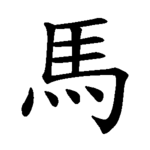Radical 187
Appearance
(Redirected from 馬)
| 馬 | ||
|---|---|---|
| ||
| 馬 (U+99AC) "horse" | ||
| Pronunciations | ||
| Pinyin: | mǎ | |
| Bopomofo: | ㄇㄚˇ | |
| Wade–Giles: | ma3 | |
| Cantonese Yale: | ma5 | |
| Jyutping: | maa5 | |
| Japanese Kana: | バ ba / マ ma / メ me (on'yomi) うま uma (kun'yomi) | |
| Sino-Korean: | 마 ma | |
| Hán-Việt: | mã | |
| Names | ||
| Chinese name(s): | (Left) 馬字旁/马字旁 mǎzìpáng (Bottom) 馬字底/马字底 mǎzìdǐ | |
| Japanese name(s): | 馬/うま uma (Left) 馬偏/うまへん umahen | |
| Hangul: | 말 mal | |
| Stroke order animation | ||
 | ||


Radical 187 or radical horse (馬部) meaning "horse" is one of the 8 Kangxi radicals (214 radicals in total) composed of 10 strokes.
In the Kangxi Dictionary, there are 472 characters (out of 49,030) to be found under this radical.
马, the simplified form of 馬, is the 58th indexing component in the Table of Indexing Chinese Character Components predominantly adopted by Simplified Chinese dictionaries published in mainland China, while the traditional form 馬 is listed as its associated indexing component. The simplified form 马 is derived from the cursive script form of 馬.
Evolution
[edit]-
Oracle bone script character
-
Bronze script character
-
Large seal script character
-
Small seal script character
-
Semi-cursive script form
-
Cursive script form
Derived characters
[edit]| Strokes | Characters (馬) | Characters (马) |
|---|---|---|
| +0 | 馬 | 马SC (=馬) |
| +2 | 馭 馮 | 驭SC (=馭) |
| +3 | 馯 馰 馱 馲 馳 馴 馵 | 驮SC (=馱) 驯SC (=馴) 驰SC (=馳) |
| +4 | 馶 馷 馸 馹 馺 馻 馼 馽 馾 馿 (=驢) 駀 駁 駂 駃 駄 (=馱) 駅JP (=驛) 駆JP (=驅) 駇 (=馼) | 驱SC (=驅) 驲SC (=馹) 驳SC (=駁) 驴SC (=驢) |
| +5 | 駈 (=驅) 駉 駊 駋 駌 駍 駎 駏 駐 駑 駒 駓 駔 駕 駖 駗 駘 駙 駚 駛 駜 駝 駞 駟 駠 | 驵SC (=駔) 驶SC (=駛) 驷SC (=駟) 驸SC (=駙) 驹SC (=駒) 驺SC (=騶) 驻SC (=駐) 驼SC (=駝) 驽SC (=駑) 驾SC (=駕) 驿SC (=驛) 骀SC (=駘) |
| +6 | 駡 (=罵 -> 网) 駢 駣 駤 駥 駦 駧 駨 駩 駪 駫 駬 駭 駮 駯 駰 駱 駲 | 骁SC (=驍) 骂SC (=罵 -> 网) 骃SC (=駰) 骄SC (=驕) 骅SC (=驊) 骆SC (=駱) 骇SC (=駭) 骈SC (=駢) 骉SC (=驫) |
| +7 | 駴 駵 (=騮) 駶 駷 駸 駹 駺 駻 駼 駽 駾 駿 騀 騁 騂 騃 | 骊SC (=驪) 骋SC (=騁) 验SC (=驗) 骍SC (=騂) 骎SC (=駸) 骏SC (=駿) |
| +8 | 駳 騄 騅 騆 騇 騈 (=駢) 騉 騊 騋 騌 (=騣) 騍 騎 騏 騐 (=驗) 騑 騒JP (=騷) 験JP (=驗) | 骐SC (=騏) 骑SC (=騎) 骒SC (=騍) 骓SC (=騅) 骔 (=騌) 骕SC (=驌) 骖SC (=驂) |
| +9 | 騔 騕 騖 騗 (=騙) 騘 騙 騚 騛 騜 騝 騞 騟 騠 騡 騢 騣 騤 騥 騦 騧 騨JP (=驒) | 骗SC (=騙) 骘SC (=騭) 骙SC (=騤) 骚SC (=騷) 骛SC (=騖) |
| +10 | 騩 騪 騫 騬 騭 騮 騯 騰 騱 騲 騳 騴 騵 騶 騷 騸 | 骜SC (=驁) 骝SC (=騮) 骞SC (=騫) 骟SC (=騸) |
| +11 | 騹 (=騏) 騺 騻 騼 騽 騾 騿 驀 驁 驂 驃 驄 驅 驆 驇 (=騺) | 骠SC (=驃) 骡SC (=騾) 骢SC (=驄) |
| +12 | 驈 驉 驊 驋 驌 驍 驎 驏 驐 驑 (=騮) 驒 驓 驔 驕 | 骣SC (=驏) |
| +13 | 驖 驗 驘 (=騾) 驙 驚 驛 驜 | |
| +14 | 驝 驞 驟 | 骤SC (=驟) |
| +16 | 驠 驡 驢 驣 | 骥SC (=驥) |
| +17 | 驤 驥 驦 驧 | 骦SC (=驦) 骧SC (=驤) |
| +18 | 驨 驩 | |
| +19 | 驪 | |
| +20 | 驫 |
Sinogram
[edit]The radical is also used as an independent Chinese character. It is one of the Kyōiku kanji or Kanji taught in elementary school in Japan.[1] It is a second grade kanji[1]
References
[edit]- ^ a b "The Kyoiku Kanji (教育漢字) - Kanshudo". www.kanshudo.com. Archived from the original on March 24, 2022. Retrieved 2023-05-06.
Literature
[edit]- Fazzioli, Edoardo (1987). Chinese calligraphy : from pictograph to ideogram : the history of 214 essential Chinese/Japanese characters. calligraphy by Rebecca Hon Ko. New York: Abbeville Press. ISBN 0-89659-774-1.
External links
[edit]Wikimedia Commons has media related to Radical 187.






